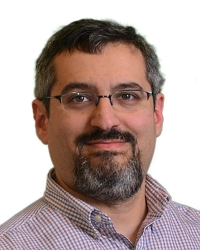TR2019-136
Distributed Asynchronous Cyclic Delay Diversity-Based Cooperative Systems with a Passive Eavesdropper
-
- , "Distributed Asynchronous Cyclic Delay Diversity-Based Cooperative Systems with a Passive Eavesdropper", IEEE Global Communications Conference (GLOBECOM), December 2019, pp. 1-6.BibTeX TR2019-136 PDF
- @inproceedings{Kim2019dec2,
- author = {Kim, Kyeong Jin and Liu, Hongwu and Wen, Maiwen and Orlik, Philip V. and Poor, H. Vincent},
- title = {{Distributed Asynchronous Cyclic Delay Diversity-Based Cooperative Systems with a Passive Eavesdropper}},
- booktitle = {IEEE Global Communications Conference (GLOBECOM)},
- year = 2019,
- pages = {1--6},
- month = dec,
- url = {https://www.merl.com/publications/TR2019-136}
- }
- , "Distributed Asynchronous Cyclic Delay Diversity-Based Cooperative Systems with a Passive Eavesdropper", IEEE Global Communications Conference (GLOBECOM), December 2019, pp. 1-6.
-
MERL Contact:
-
Research Areas:
Communications, Electronic and Photonic Devices, Signal Processing
Abstract:
A joint data and jamming transmission scheme based on a new distributed asynchronous cyclic delay diversity (dACDD) scheme is proposed for cooperative communication systems. Without any exact knowledge of channel state information (CSI) at the transmitting side, a joint remote radio head (RRH) selection scheme for the data and jamming signal transmissions is proposed for dACDD to achieve the maximum diversity gain at a legitimate user (LU), while degrading the receive signalto-interference-plus-noise ratio at an eavesdropping user (EU). A single RRH connected with the channel having the greatest channel gain is selected as a data RRH that transmits a desired confidential signal, whereas the remaining RRHs are controlled by the central control unit to transmit an artificial noise sequence (ANS) to the LU and EU. Without assuming exact knowledge of CSI of the whole system, the secrecy outage probability of the distributed communication system is analyzed by deriving a closed-form expression, and through link-level simulations over non-identically distributed frequency selective fading channels over the entire system.
Related News & Events
-
NEWS MERL Scientists Presenting 11 Papers at IEEE Global Communications Conference (GLOBECOM) 2019 Date: December 9, 2019 - December 13, 2019
Where: Waikoloa, Hawaii, USA
MERL Contacts: Jianlin Guo; Toshiaki Koike-Akino; Philip V. Orlik; Pu (Perry) Wang
Research Areas: Communications, Computer Vision, Machine Learning, Signal Processing, Information SecurityBrief- MERL Signal Processing scientists and collaborators will be presenting 11 papers at the IEEE Global Communications Conference (GLOBECOM) 2019, which is being held in Waikoloa, Hawaii from December 9-13, 2019. Topics to be presented include recent advances in power amplifier, MIMO algorithms, WiFi sensing, video casting, visible light communications, user authentication, vehicular communications, secrecy, and relay systems, including sophisticated machine learning applications. A number of these papers are a result of successful collaboration between MERL and world-leading Universities including: Osaka University, University of New South Wales, Oxford University, Princeton University, South China University of Technology, Massachusetts Institute of Technology and Aalborg University.
GLOBECOM is one of the IEEE Communications Society’s two flagship conferences dedicated to driving innovation in nearly every aspect of communications. Each year, more than 3000 scientific researchers and their management submit proposals for program sessions to be held at the annual conference. Themed “Revolutionizing Communications,” GLOBECOM2019 will feature a comprehensive high-quality technical program including 13 symposia and a variety of tutorials and workshops to share visions and ideas, obtain updates on latest technologies and expand professional and social networking.
- MERL Signal Processing scientists and collaborators will be presenting 11 papers at the IEEE Global Communications Conference (GLOBECOM) 2019, which is being held in Waikoloa, Hawaii from December 9-13, 2019. Topics to be presented include recent advances in power amplifier, MIMO algorithms, WiFi sensing, video casting, visible light communications, user authentication, vehicular communications, secrecy, and relay systems, including sophisticated machine learning applications. A number of these papers are a result of successful collaboration between MERL and world-leading Universities including: Osaka University, University of New South Wales, Oxford University, Princeton University, South China University of Technology, Massachusetts Institute of Technology and Aalborg University.
